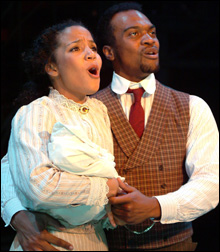|

TWO CHEERS: One for
Ragtime
, and another for New Rep’s production.
|
The wheels of a dream are spinning New Repertory Theatre into a new era with its production of Ragtime (at the Arsenal Center for the Arts through May 28). I mean not just the era captured in the Tony-winning 1998 musical based on E.L. Doctorow’s novel that stirs fact into fiction in the melting pot of turn-of-the-20th-century New York, but also a new age for the theater company, which moved last fall from its Newton Highlands church digs, out of which it was bursting, into a larger, more state-of-the-art space at the Arsenal Center for the Arts. Ragtime, with its interconnected stories, its stirring anthems infused with the “new music” of the title, and its vast sociological swirl, has the ability to thrill, and at New Rep it does. You just want to stand up and cheer, partly for Ragtime and partly for New Rep, which is finally in command of its improved situation.
Ragtime is surprisingly fine for an enterprise created by committee, with Canadian producer Garth Drabinsky shopping for a creative team as if by catalogue, bringing together librettist Terrence McNally, the team of composer Stephen Flaherty and Lynn Ahrens (who auditioned), and director Frank Galati. But McNally masterfully compresses the source material, in which the stories of three families — a white-clad WASP clan living in New Rochelle, a black pianist turned terrorist when his fiancée is killed, and a Latvian immigrant trying to pull himself and his little girl up by bootstraps of ingenuity — are interwoven with events of the day that include the murder of architect Stanford White by millionaire Harry Thaw (whose wife, sex goddess Evelyn Nesbit, was White’s mistress), the ascents of “modern pharaohs” Henry Ford and J.P. Morgan and “fabulous immigrant” Harry Houdini, and the anarchist agitation of Emma Goldman. Moreover, the songs are as full of feeling as they are of syncopation.
Artistic director Rick Lombardo has proved his adeptness with musicals, even when he had to shoehorn Sweeney Todd into space more suited to Spalding Gray. Here he’s collected a stirring contingent of voices, known and unknown, to handle the demands of Flaherty’s soaring score, in which snatches of the title tune and the haunting “New Music” turn up like not-bad pennies. Particularly splendid are Leigh Barrett, whose Mother conveys the disappointed sadness of falling out of love and artfully balances fire and rue in her singing, and Boston Conservatory sophomore Stephanie Umoh, who, handed the impossible task of delivering “Your Daddy’s Son,” a song built on the voice of Audra McDonald, plumbs both its dissonance and its drama. Maurice E. Parent, in his fourth Ragtime turn, plays dapper pianist suitor Coalhouse Walker Jr. to Umoh’s shy, intense Sarah, and their duets — the hopeful “Wheels of a Dream,” performed before an operational Model T Ford, and the frisky flashback “Sarah Brown Eyes” — are irresistibly sweet. As immigrant Tateh, a Cinderella in Tevye’s clothing, Robert Saoud counters a trace of ham with some compelling singing.
Janie E. Howland is responsible for the scenic design: wheeled platforms scooted around a barnlike space decorated with patriotic bunting. This works well enough, but the reconfigurations need to be speeded up. Ragtime’s connections to American history are reinforced by Dorian Des Lauriers’s projection design, in which a continual stream of period slides is projected on screens at either side of the playing space. Between Lombardo’s deft direction and Kelli Edwards’s parading, circular choreography, the production is well integrated, never more so than in the opening number in which WASPs, African-Americans, and huddled immigrants burst from their clusters to interweave, the melting pot become melting braid. Todd C. Gordon leads an eight-person orchestra that hovers above the action stage left, providing accompaniment and leitmotiv. And the ensemble of 33 proves to be a very deep bench.
The week also marked the Boston debut of another American musical that has broad sociological sweep — though it never ventures far from a sweltering basement in Lake Charles, Louisiana, and has as its protagonist a woman who doubtless knows her way around a broom. (No, not Elphaba of Wicked.) Mostly, however, the eponymous domestic of Caroline, or Change (presented by SpeakEasy Stage Company in association with North Shore Music Theatre at the Calderwood Pavilion through June 3) spends her maid’s life in sweaty musical interaction with an agitating washer and a James Brown–ish dryer that do indeed sing back, along with a radio represented by three pink-clad women doing that early-Supremes thing. The musical, with book and lyrics by Pulitzer winner Tony Kushner and music by Jeanine Tesori, is set in 1963 and also features an aching basso of a city bus delivering a dirge for just-assassinated president John F. Kennedy. As the score asserts over and over, “Change come fast and change come slow,” but whatever its trajectory, change for African-Americans, even in the bayous of Louisiana, is coming.
ADVERTISEMENT
 |